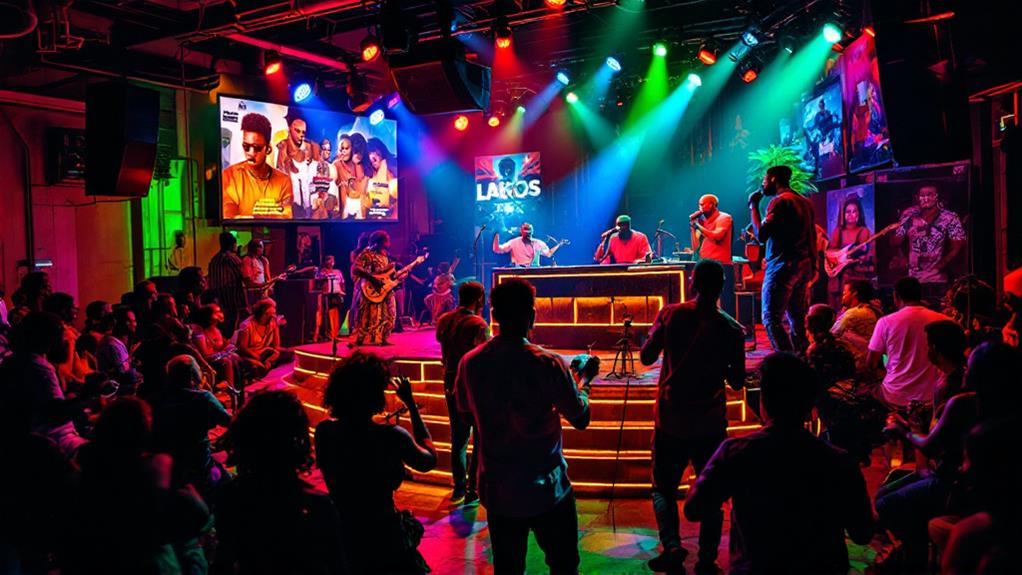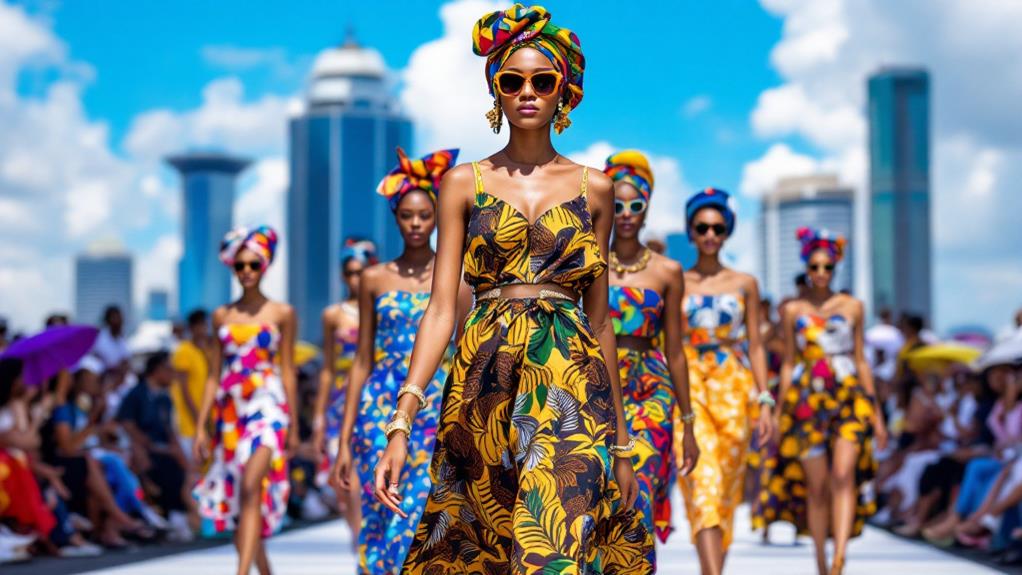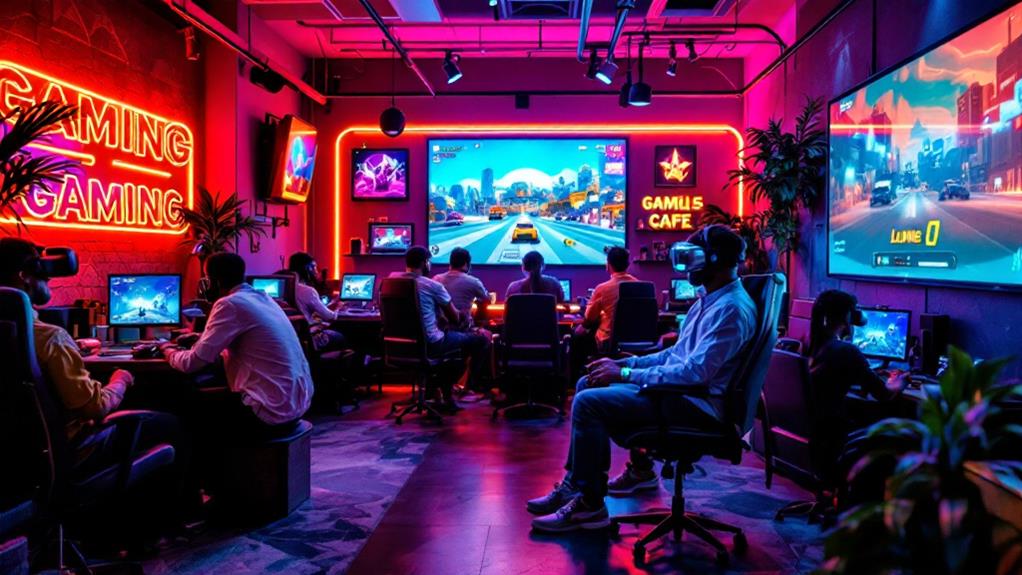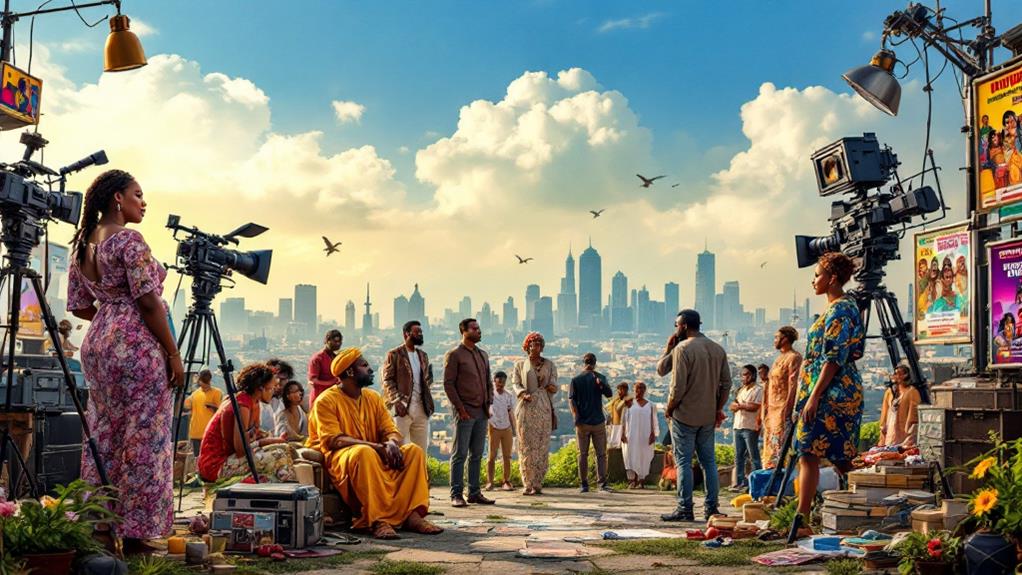Entertainment in Nigeria: A Thriving Industry of Music, Movies, and More

Nigeria's entertainment industry is booming, offering a lively mix of music, movies, fashion, comedy, and tech innovations. You'll find Nollywood churning out thousands of films annually, while Afrobeats stars like Burna Boy and Wizkid dominate global charts. Nigerian fashion blends traditional elements with modern designs, making waves internationally. The comedy scene has exploded on social media, with digital stars amassing millions of followers. Even the gaming sector is on the rise, with local developers creating innovative mobile games. This thriving industry contributes extensively to Nigeria's economy, showcasing the country's creative prowess. Unearth how Nigeria's entertainment realm continues to evolve and inspire.
Nollywood's Global Impact

A powerhouse of African cinema, Nollywood has risen to become the second-largest film industry globally, leaving an enduring, lasting, permanent mark on world entertainment. You'll be amazed to learn that Nollywood produces around 2,500 movies annually, contributing over $660 million to Nigeria's economy. This staggering output has catapulted the Nigerian film industry onto the world stage, enchanting audiences with its thrilling blockbusters and thought-provoking dramas.
Nollywood's global influences are evident in its growing collaborations with Hollywood and its ability to showcase Nigerian artists and culture to international audiences. As streaming platforms continue to expand, Nollywood's reach has grown exponentially, bringing its unique storytelling to viewers worldwide. The industry's success is reflected in its impressive box office revenue, which surged to N6.94 billion in 2022. This financial triumph has led to increased focus on intellectual property rights (IPR) to protect the creative works of Nigerian filmmakers. With top producers and actors earning billions of naira annually, Nollywood's film production continues to thrive, solidifying its position among the world's leading movie industries.
Rise of Afrobeats
Pulsating rhythms and infectious melodies have propelled Afrobeats to global stardom, with Nigerian artists at the forefront of this musical revolution. You've likely heard the alluring sounds of Burna Boy, Wizkid, and Davido, who've been instrumental in bringing Nigerian music to the world stage. Their unique fusion of African rhythms and global influences has created an irresistible style that's resonating with millions worldwide.
The rise of Afrobeats isn't just about musical innovation; it's also driving significant growth in the Nigerian entertainment industry. In 2022 alone, Nigerian Afrobeats artists generated over ₦11 billion in revenue on Spotify, highlighting the genre's commercial success. This surge has positioned Nigeria as the second-best-performing entertainment and media consumer market globally.
As Afrobeats continues to gain traction, you'll notice the increasing influence of digital platforms on music listening and consumption in Nigeria. Dedicated streaming services like Boomplay, alongside global giants iTunes and Spotify, are shaping how you explore and enjoy this vibrant music genre. The rise of Afrobeats is a testament to the power of Nigerian creativity and its ability to captivate audiences worldwide.
Fashion's Cultural Fusion

Just as Afrobeats has revolutionized Nigeria's music scene, the country's fashion industry is making waves on the global stage. You'll find Nigerian fashion designers blending traditional cultural elements with bold, innovative designs, creating a unique aesthetic that's capturing international attention.
The Nigerian apparel market is booming, with projections reaching US$9.23 billion in 2024. Women's apparel leads the charge, accounting for a substantial US$3.59 billion. Lagos, the country's fashion hub, commands an impressive 15% of Sub-Saharan Africa's US$31 billion ready-to-wear market.
This cultural fusion in fashion isn't just about style; it's driving economic growth. The fashion manufacturing sector contributed 17.7% to total manufacturing value in the first half of 2023, highlighting its significant impact on Nigeria's economy.
As you immerse yourself in Nigerian fashion, you'll uncover a diverse talent pool of top designers who are pushing boundaries and redefining global fashion trends. Their work showcases the country's rich cultural heritage while embracing modern aesthetics. This unique blend of tradition and innovation has positioned Nigeria as a formidable player in the international fashion scene, with its influence continuing to expand.
Comedy's Digital Revolution
Nigeria's comedy ecosystem has undergone a dramatic shift in recent years, thanks to the digital revolution. You'll find that social media platforms like Instagram and YouTube have become the new stages for aspiring comedians, allowing them to showcase their talent and build massive followings. This democratization of the comedy industry has opened doors for fresh voices, bypassing traditional media channels.
You'll notice how online comedians like Maraji, Taaooma, and Mr. Macaroni have skyrocketed to fame, amassing millions of followers and transitioning from online skits to mainstream entertainment. The digital era has reshaped the comedy sector, enabling direct audience engagement and experimentation with new formats. As a result, you're witnessing a rapid industry expansion, with content monetization becoming more accessible to emerging talents.
The increased popularity of Nigerian comedy on digital platforms has nurtured a new generation of comedic voices. You can now enjoy a diverse range of comedic styles and perspectives, all at your fingertips. This digital revolution has not only transformed how comedy is created and consumed but has also solidified Nigeria's position as a comedy powerhouse in Africa.
Gaming and Tech Innovations

While comedy thrives in the digital sphere, another entertainment sector is making waves in Nigeria: gaming. You'll find a rapidly growing industry with a projected market value of $158 million by 2025 and over 13 million gamers. Nigerian game development studios like Maliyo Games and Kuluya are at the forefront, creating innovative mobile games that cater to both local and global audiences.
The country's tech ecosystem is nurturing this growth, with technology hubs like Lagos' Co-creation Hub providing a fertile ground for gaming startups. These hubs are cultivating an environment where entrepreneurs can develop cutting-edge entertainment solutions. The Nigerian government is also playing its part, launching initiatives like the Nigeria Creative Industries Initiative to support the gaming and technology sectors.
You'll notice that Nigeria's thriving fintech sector is fueling this growth, too. Mobile payment platforms like Flutterwave and Paystack are opening up new revenue streams for the entertainment industry. This convergence of gaming, tech innovations, and fintech is creating a dynamic landscape where creative startups can flourish, transforming Nigeria's entertainment industry and positioning it as a major player in the global gaming market.
Economic Contributions and Challenges
Despite facing significant challenges, the Nigerian entertainment industry has become a powerhouse in the country's economy. You'll be impressed to learn that in 2021, it contributed $660 million to Nigeria's GDP, accounting for 2.3% of the total. The music industry alone employed over 1 million people and generated a staggering $8 billion for the economy.
However, you should be aware of the impediments this thriving sector faces. Copyright piracy remains a significant obstacle, hindering the growth of intellectual property rights and making it difficult to monetize entertainment services. The COVID-19 pandemic hit the industry hard, forcing downsizing and salary cuts due to high operational costs.
Infrastructure issues also plague the entertainment industry. You'll find that inconsistent power supply and inadequate roads increase production costs and time. Despite these obstacles, the industry is projected to exceed $1 billion in export revenue. As you can see, the Nigerian entertainment industry's economic contributions are substantial, but addressing these issues is imperative for its continued growth and development.



